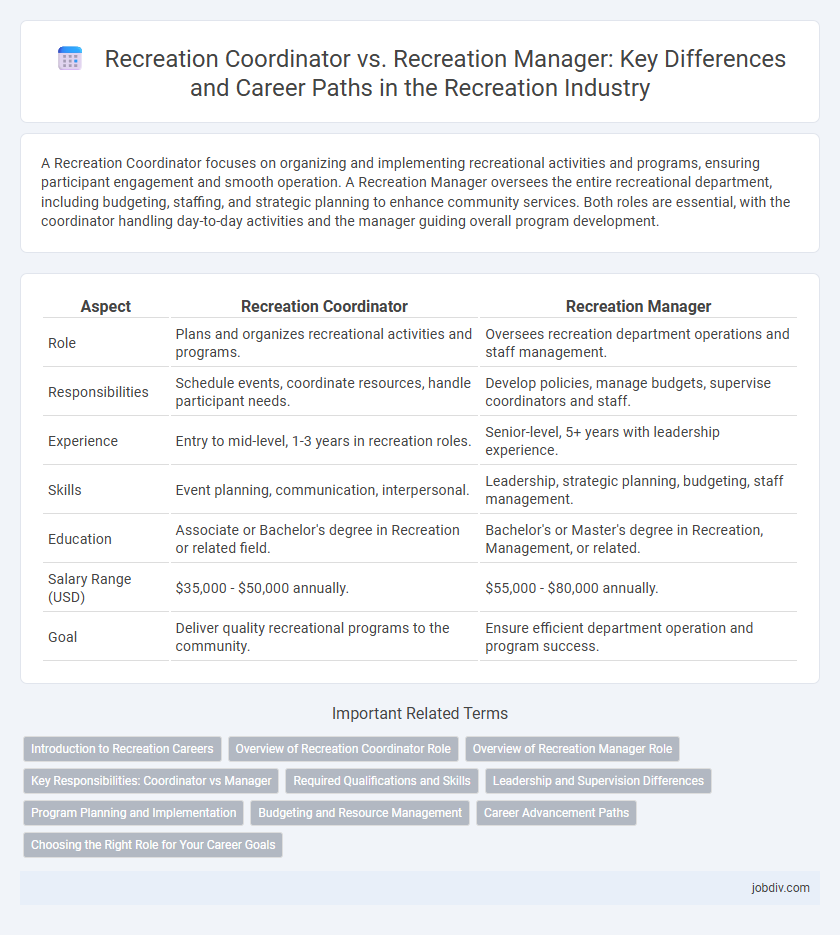A Recreation Coordinator focuses on organizing and implementing recreational activities and programs, ensuring participant engagement and smooth operation. A Recreation Manager oversees the entire recreational department, including budgeting, staffing, and strategic planning to enhance community services. Both roles are essential, with the coordinator handling day-to-day activities and the manager guiding overall program development.
Table of Comparison
| Aspect | Recreation Coordinator | Recreation Manager |
|---|---|---|
| Role | Plans and organizes recreational activities and programs. | Oversees recreation department operations and staff management. |
| Responsibilities | Schedule events, coordinate resources, handle participant needs. | Develop policies, manage budgets, supervise coordinators and staff. |
| Experience | Entry to mid-level, 1-3 years in recreation roles. | Senior-level, 5+ years with leadership experience. |
| Skills | Event planning, communication, interpersonal. | Leadership, strategic planning, budgeting, staff management. |
| Education | Associate or Bachelor's degree in Recreation or related field. | Bachelor's or Master's degree in Recreation, Management, or related. |
| Salary Range (USD) | $35,000 - $50,000 annually. | $55,000 - $80,000 annually. |
| Goal | Deliver quality recreational programs to the community. | Ensure efficient department operation and program success. |
Introduction to Recreation Careers
Recreation Coordinators develop and implement community programs, engaging participants in activities while managing schedules and resources effectively. Recreation Managers oversee the strategic planning and administration of recreational services, ensuring compliance with policies and optimizing budget allocation. Both roles require strong interpersonal skills and a passion for promoting wellness and social interaction through recreational activities.
Overview of Recreation Coordinator Role
A Recreation Coordinator organizes and implements community programs, focusing on engagement and participant satisfaction. They handle scheduling, resource allocation, and promotion of recreational activities to promote health and wellness. Their role requires strong communication skills and the ability to adapt programs to diverse community needs.
Overview of Recreation Manager Role
A Recreation Manager oversees the planning, development, and implementation of recreational programs and facilities, ensuring alignment with organizational goals and community needs. They manage staff, budgets, and resources to deliver high-quality recreational services while maintaining safety and compliance standards. Strategic leadership and operational oversight distinguish the Recreation Manager role from other positions like the Recreation Coordinator.
Key Responsibilities: Coordinator vs Manager
A Recreation Coordinator focuses on planning and organizing specific recreational activities, managing day-to-day event logistics, and coordinating volunteers and participants to ensure smooth program execution. In contrast, a Recreation Manager oversees the overall recreation department, develops strategic plans, manages budgets, supervises staff, and evaluates program effectiveness to meet community needs. The Coordinator's role is more operational, while the Manager emphasizes leadership, resource allocation, and long-term program development.
Required Qualifications and Skills
Recreation Coordinators typically require a bachelor's degree in recreation, leisure studies, or a related field, along with strong organizational and communication skills to plan and execute community programs effectively. Recreation Managers usually need advanced experience or a master's degree in recreation management, leadership abilities, budgeting expertise, and strategic planning skills to oversee multiple programs and manage staff efficiently. Both roles demand proficiency in conflict resolution, customer service, and knowledge of safety regulations to ensure successful recreation activities.
Leadership and Supervision Differences
Recreation Coordinators typically focus on direct program management and participant engagement, providing hands-on leadership to staff and volunteers during activities. Recreation Managers oversee broader operational strategies, including budgeting, staff supervision, and long-term planning to ensure organizational goals are met. The primary difference lies in the scope of leadership, with managers holding higher-level supervisory roles and coordinators handling day-to-day recreational program execution.
Program Planning and Implementation
A Recreation Coordinator primarily focuses on developing and executing community-based programs, ensuring activities meet participant needs and adhere to budgets. In contrast, a Recreation Manager oversees multiple program coordinators, strategic planning, and resource allocation to optimize overall recreational services and facility operations. Effective program planning and implementation hinge on the coordinator's detailed session management and the manager's broader organizational leadership.
Budgeting and Resource Management
Recreation Coordinators typically handle day-to-day budgeting tasks and allocate resources for specific programs or events, ensuring efficient use of funds within established limits. Recreation Managers oversee broader financial planning, including developing annual budgets, securing funding, and managing resource distribution across multiple projects or departments. Effective budgeting and resource management in recreation require both roles to collaborate on maximizing program output while minimizing costs.
Career Advancement Paths
Recreation Coordinators typically manage program implementation and community engagement, gaining hands-on experience that serves as a foundation for promotion to Recreation Manager roles. Recreation Managers oversee broader operational functions, budgeting, and strategic planning, positioning themselves for senior leadership opportunities in parks and recreation departments. Advancing from Coordinator to Manager often requires enhanced project management skills, certification such as CPRP (Certified Park and Recreation Professional), and proven success in enhancing community participation rates.
Choosing the Right Role for Your Career Goals
Choosing between a Recreation Coordinator and a Recreation Manager depends on your career goals and preferred responsibilities. Recreation Coordinators focus on planning and implementing activities, requiring strong organizational skills and direct community engagement, ideal for those passionate about hands-on event management. Recreation Managers oversee program development, staff supervision, and budgeting, making this role suitable for professionals aiming for leadership and strategic planning in recreational services.
Recreation Coordinator vs Recreation Manager Infographic

 jobdiv.com
jobdiv.com